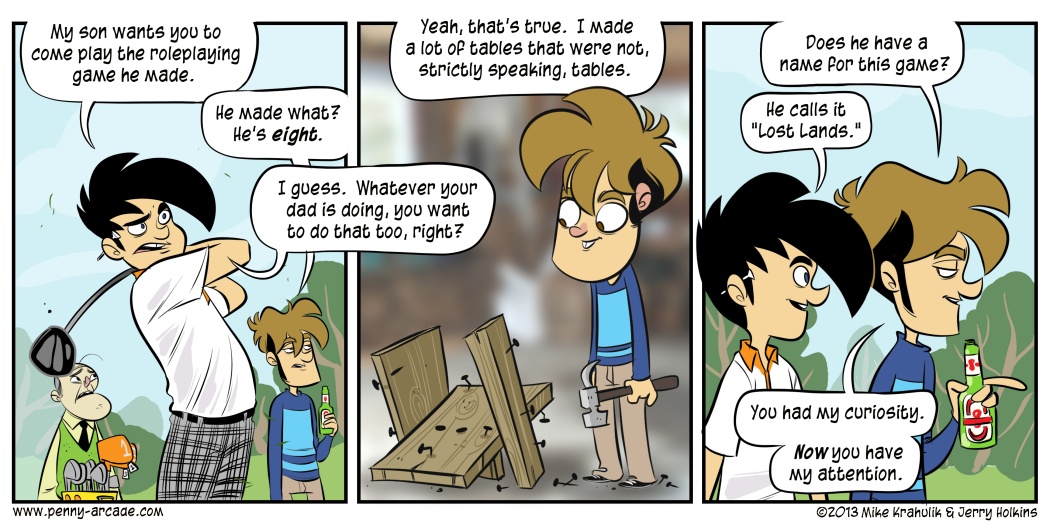I'm sorry I didn't put this Amplitude stuff up yesterday, but I ended up talking to Scott for a very long time on the telephone. Then I had to adore my kitten for several hours, after which Brenna wanted to watch Igby Goes Down. Claire Danes, I've missed you.
When we became enamored with Rez, many people suggested we try Frequency, which had come out the previous year. Sony's broadband adapter for the PS2 comes with a demo of the game, without which I might never have gotten around to it - but immediately I understood what the fuss was about. Rez isn't really about rhythm as such - any music that happens to occur emerges organically from play. In Frequency, virtually every musical sound the game produces is the result of player actions. Imagine Tempest, with the player at the mouth of a tube of sorts - each section of this tube is a track from the song, bass, drums, what have you. By keying in increasingly complex button patterns, you slowly build an entire song. Another thing that characterizes Frequency is a plethora of licensed music, from bands like No Doubt or Garbage, let's say. As a general rule, I do not listen to No Doubt. There are certainly arguments to be made for not manually constructing their songs so that they remain inaudible. However, I find that the music choices, even from bands I'm not nuts about, still make for good gameplay. The selections are also fairly diverse, genre-wise. After unlocking every song the game had to offer, I spent more time in the Remix mode. It is possible that many people did not utilize the "remix" type of gameplay, where you take the samples that comprise each song and create your own version, but that is the main reason I own it.
Amplitude, Frequency's successor, is identical to the original except in those cases where it is not.
Unlike Frequency (which required a free disc to unlock its online play), Amplitude's multiplayer experience is built in and I believe includes some new game modes. I might be wrong, I was sort of an evangelist about the first game and have been loaning it out to people so I can't compare manuals. Instead of a rounded tube, solo play takes place on a flat line - reminiscent of a fretboard or musical staves. Visually, the levels are imagined extremely well, with what appears to be sharper resolution, richer color, and backgrounds that react to each press of a button. I'm not sure if I like the musical choices quite as well on the whole, but as I mentioned, the gameplay is still quite sound - and even then, I still have a handful of songs to unlock. Remix mode is much more streamlined, with each section being mixed being given an explicit title - Chorus, Verse, that sort of thing - which is altered once by you, and then takes the place of every Chorus or Verse in the song. There is even an online repository where players can share their remixes, which is commendable. Playing and defeating songs unlocks not only new levels with more songs, but also new parts to build your 3D representation, or "Freq." This little guy can be seen playing whatever track you're on, sometimes with a Mic, sometimes with a keyboard, playing in exact time to your input. They also accompany and identify you online, so it's a nice way to personalize your appearance.
There are two choices about remix mode that I don't know if I like as well, though the game still comes highly recommended.
You do have less control over the way vocals work. They're essentially pre-entered for you, rather than giving you the ability to play around with them. Ninety-nine percent of the time, I'll bet this isn't a big deal - it was just nice to know I had the ability to change it.
There is a feature called "Freestyle" mode that gives you access to the Scratcher or the Axe which allow you to cut wax or generate notes, respectively. While it looks a great deal cooler in Amplitude than it does in Frequency, I can't say I support the new Scratcher. The new Axe, that's good! Instead of just higher or lower pitch, you can filter the sound as well, which is much more analog in feeling and end result. By comparison, the new Scratcher has these sort of pre-set scratching speeds that you cue up, compared to the old way, which was entirely controlled by the left stick. The Scratcher and the Axe also seem to take place in a strange digital soundscape instead of the actual game, it doesn't get recorded on the staves, so you can't really use them as accents in a song. By playing around with the pitch, I'm getting to the point where I can replicate the old way, but I just don't feel like these were good decisions.
Don't let that stuff scare you off, though. Like I said, I'll bet most people never even choose Remix in the menu. If you're looking for a challenging rhythm game that is also a lot of fun, you couldn't ask for much better than Amplitude.
(CW)TB
